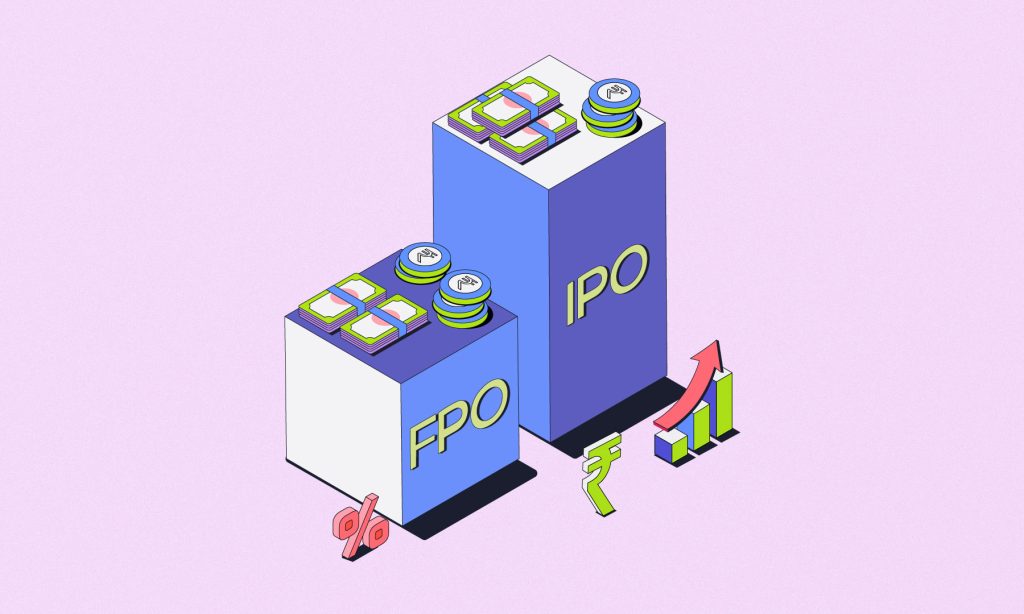Before investing in the stock market, every investor has to understand some basic terms. IPO and FPO are two such terms. They pertain to investments in the stock market.
The main difference between IPOs and FPOs
Companies put out IPOs (Initial Public Offerings) and FPOs (Follow-on Public Offers) when they are seeking to generate money from the equity market.
What is an IPO?
IPO stands for Initial Public Offering. It is a common term in the stock market. Any company that wants to grow must issue an IPO. An IPO is more or less like a share—it gives the buyer a stake in the company.
Money raised in this way helps the corporation pursue and accomplish business objectives, such as rapid expansion. When looking to borrow money in this way, improved openness and share listing reliability may help get better terms.
Any new venture may choose to go public with an IPO when it feels mature enough to meet the requirements of the Security Exchange Board of India (SEBI). The company seeking an IPO should also feel confident enough to assume all obligations toward common stockholders.
Many organizations on the IPO journey use Employee Stock Ownership Plans or ESOPs or profit sharing to align the interest of employees with shareholders.
What is an FPO?
In the share market, FPO, or a “follow-on public offer,” is the route a business takes to raise funds when it is already listed on a stock market. Companies undertake an FPO to increase the size of their stock base. So the first issue is the IPO, and the second is the FPO.
FPOs are raised with two goals in mind:
- To decrease an organization’s existing debt
- To help a business generate more money
If we compare an FPO to an IPO, an FPO is a more affordable and secure solution.
Top differences between IPO and FPO
IPOs and FPOs differ in terms of their objectives, risks, profitability, share capital, and value. Each of these factors is discussed at length below.
Objective
As the name implies, FPOs are a continuation of IPOs. The IPO is part of the initial fundraising that helps the firm go public. After a firm is already listed on a stock market, an FPO is issued. So the FPO is an extra issue.
Profitability
Because investors participate in the company’s initial growth, IPOs can offer larger returns than FPOs. FPOs often involve less risk than IPOs because, by the time an FPO occurs, investors usually have access to all relevant information about the firm.
Value
The value of IPO is expensive as compared to FPO. Also, most of the time, FPOs are less expensive since the company’s worth is being progressively eroded.
Risk
The price set for an FPO is lower than the market price. This helps entice shareholders. So FPOs tend to be less risky.
Share Capital
An IPO simply implies that the public can purchase the company’s shares. FPO refers to the issuance of stock listed in the market to the company’s current shareholders or new investors.
Conclusion
Whether you choose an FPO or IPO depends on your goals and the amount of risk. To invest in an IPO, you need to be exceedingly risk-averse because you don’t know anything about the firm. For the novice and independent investors, an FPO may therefore be a safer bet.
FAQs
What role does a registrar play in an IPO?
One important entity for handling IPOs is the registrar of public issues. They are autonomous financial institutions that have stock exchange and SEBI registrations. The firm that plans to go public has to choose a registrar.
The basic duties of an IPO registrar include processing the IPO application, allocating shares to applicants in accordance with SEBI regulations, processing refunds by ECS or check, and transferring allotted shares to clients’ Demat accounts
What does a Non-Dilutive FPO mean?
A Non-Dilutive FPO is when the shareholders of a company publicly sell their private shares. In this case, the money does not go to the firm but rather directly to the person selling it. As a result, the company’s earnings per share are unaffected.
What are the differences between IPO and FPO?
IPO (Initial Public Offering) is the first sale of shares to the public, while FPO (Follow-on Public Offering) is when a publicly listed company issues more shares to raise capital after its IPO.
Which is profitable IPO or FPO?
Profitability between IPO (Initial Public Offering) and FPO (Follow-on Public Offering) can vary. IPOs offer potential for higher returns but also higher risk. FPOs are generally more stable but may offer lower returns. It depends on individual circumstances and market conditions.
Why do companies launch FPO?
Companies launch FPOs (Follow-on Public Offerings) to raise additional capital. This can be used for expansion, debt reduction, working capital, or other corporate purposes, helping them grow and strengthen their financial position.
Can IPO be sold after listing?
Yes, IPO shares can be sold after listing, typically once they are available for trading on the stock exchange. However, there may be restrictions on selling during lock-up periods for insiders.








